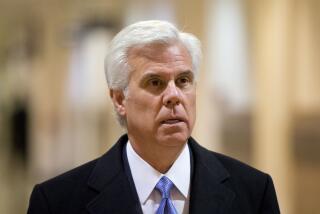Princeton-Newport Chief Denies Wrongdoing : Regan Says He Believed Stock Trades Made to Cut Firm’s Taxes Were Legal
- Share via
NEW YORK — The chief partner in a defunct New Jersey brokerage testified Monday that he believed that a series of 1984 and 1985 stock trades designed to reduce the firm’s taxes were “100% legal.”
“I did not commit a crime. I did not cheat on my taxes. I did not engage in a conspiracy. I am totally, 100% innocent,” said James Sutton Regan, the former managing partner of Princeton-Newport Partners LP.
Regan took the stand as the defense opened its arguments in the first-ever securities fraud racketeering case.
Regan, one of six defendants in the case, testified that Princeton-Newport engaged in a series of “tax trades” in 1984 and 1985 to generate short-term capital losses it could claim as tax deductions. He said the trades were necessitated in part by changes in federal laws.
“It was my belief that the transactions were entirely legal, 100% legal,” Regan testified under questioning from his attorney, Theodore Wells.
Regan, 47, speaking calmly and evenly as he explained various complex tax arrangements, described deals in which Princeton-Newport sold blocks of securities to other investment firms temporarily to claim losses for tax purposes.
The government alleges that the deals were engineered to create false long-term capital gains and short-term capital losses for Princeton-Newport in violation of federal tax laws. The indictment last year alleged millions of dollars in bogus tax losses.
But Regan testified that he was aware of federal laws when he ordered the firm to conduct so-called “day trades” in 1984 in which it sold blocks of warrants to buy stock in ICI Finance N.V. and bought them back the same day. He said all the trades were recorded in the company’s books.
He said the deals, which were conducted through Ackroyd & Smithers Securities, were subject to market fluctuation and that no prearranged buyback price had been set.
The government alleges the transactions were “parking” arrangements, in which securities owned by one party are sold to another with an agreement to repurchase them usually at a preset time and price. The government maintains that such deals are illegal if designed to skirt federal tax or disclosure laws.
Regan said he had studied federal tax law for more than 10 years and considered himself an expert in the field. He also said he had filed more than 15 supporting legal briefs about sham tax trades in cases involving federal tax laws since the mid-1970s and believed that the 1984 and 1985 trades were legal.
He said he told Princeton-Newport general partner Paul A. Berkman to conduct other trades in early 1985 through Merrill Lynch & Co. and Drexel Burnham Lambert Inc.
Some of those trades involved asking Merrill and Drexel to hold stock in various companies for at least 31 days before Princeton-Newport could repurchase it, in accordance with federal laws, he said.
“I told him the transactions had to be done within the context of the market,” he said. “I never told him what the repurchase price had to be.”
Regan added: “This kind of tax planning was common all the time. People would do anything possible to avoid long-term losses, anything legally possible.”
He testified that Princeton-Newport made about $300,000 from the 1985 transfers because its payment to other firms for holding the securities was lower than its return on investments it made with the cash it obtained for them.
Regan denied any involvement in a deal cited by the government that former Drexel trader Bruce Lee Newberg told Princeton-Newport to sell blocks of stock in COMB Co. to try to drive down its share price in 1985 before a large Drexel bond offering to the firm.
In addition to Regan, Berkman and Newberg, on trial are Princeton-Newport general partners Charles Zarzecki and Jack Z. Rabinowitz, and the firm’s controller, Steven B. Smotrich.
The case overlaps the government’s 98-count fraud and racketeering indictment of former Drexel junk bond financier Michael Milken. Much of the same evidence is expected to be introduced at Milken’s trial, scheduled to begin next March.
Princeton-Newport, a small securities firm with offices in Princeton, N.J., and Newport Beach, Calif., went out of business after the indictment was brought last August.
More to Read
Sign up for Essential California
The most important California stories and recommendations in your inbox every morning.
You may occasionally receive promotional content from the Los Angeles Times.












